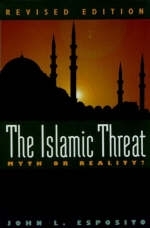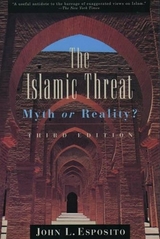
The Islamic Threat
Seiten
1996
|
2nd Revised edition
Oxford University Press Inc (Verlag)
978-0-19-510298-7 (ISBN)
Oxford University Press Inc (Verlag)
978-0-19-510298-7 (ISBN)
- Titel erscheint in neuer Auflage
- Artikel merken
Zu diesem Artikel existiert eine Nachauflage
With the death of communism as a global force, does Islam now pose the greatest threat to the West? This volume aims to show that perceptions of Islam as a militant, expansionist, anti-Western force are rooted in a long history of mutual mistrust and represent an over-simplification.
With the death of communism as a global force, does Islam - embraced by one-fifth of the world's population - now pose the greatest threat to the West? From the Ayatollah Khomeini to Saddam Hussein, the image of Islam as a militant, expansionist, rabidly anti-Western force has gripped the popular imagination. This volume aims to show that these perceptions are rooted in a long history of mutual mistrust and represent an over-simplification. Placing Islam in critical perspective, the book explores both its current resurgence and its troubled relationship with the West. The author offers a systematic assessment of Islamic politics in key nations including Iran, Libya, Lebanon, Egypt and Algeria, focusing in particular on Islamic movements, both moderate and radical. A picture of Islam emerges which is not hostile and monolithic, but diverse and complex. In addition to examining recent historical events such as the Gulf War and the Rushdie affair, this new addition takes account of recent developments in Algeria, and contains a completely revised concluding chapter, "Islam and the West: Conflict or Clash of the Civilizations?".
With the death of communism as a global force, does Islam - embraced by one-fifth of the world's population - now pose the greatest threat to the West? From the Ayatollah Khomeini to Saddam Hussein, the image of Islam as a militant, expansionist, rabidly anti-Western force has gripped the popular imagination. This volume aims to show that these perceptions are rooted in a long history of mutual mistrust and represent an over-simplification. Placing Islam in critical perspective, the book explores both its current resurgence and its troubled relationship with the West. The author offers a systematic assessment of Islamic politics in key nations including Iran, Libya, Lebanon, Egypt and Algeria, focusing in particular on Islamic movements, both moderate and radical. A picture of Islam emerges which is not hostile and monolithic, but diverse and complex. In addition to examining recent historical events such as the Gulf War and the Rushdie affair, this new addition takes account of recent developments in Algeria, and contains a completely revised concluding chapter, "Islam and the West: Conflict or Clash of the Civilizations?".
About the Author: John L. Esposito is Professor of Religion and International Affairs and Director of the Center for Muslim-Christian Understanding: History and International Affairs at the Edmund A. Walsh School of Foreign Service, Georgetown University. He has served as President of the Middle East Studies Association and as a consultant to the State Department. Editor in chief of the Oxford Encyclopedia of the Modern Islamic World, his books include Islam: The Straight Path, Islam and Politics, Islam in Asia, Voices of Resurgent Islam, and Women in Muslim Family Law.
| Erscheint lt. Verlag | 30.6.1996 |
|---|---|
| Zusatzinfo | bibliography |
| Verlagsort | New York |
| Sprache | englisch |
| Themenwelt | Geisteswissenschaften ► Religion / Theologie ► Islam |
| Sozialwissenschaften ► Politik / Verwaltung ► Europäische / Internationale Politik | |
| Sozialwissenschaften ► Soziologie | |
| ISBN-10 | 0-19-510298-3 / 0195102983 |
| ISBN-13 | 978-0-19-510298-7 / 9780195102987 |
| Zustand | Neuware |
| Informationen gemäß Produktsicherheitsverordnung (GPSR) | |
| Haben Sie eine Frage zum Produkt? |
Mehr entdecken
aus dem Bereich
aus dem Bereich



